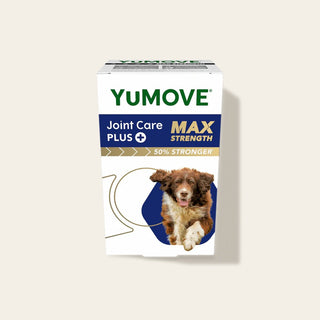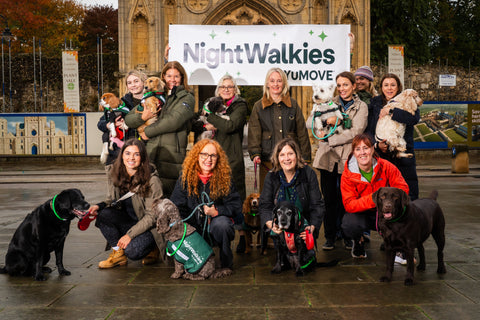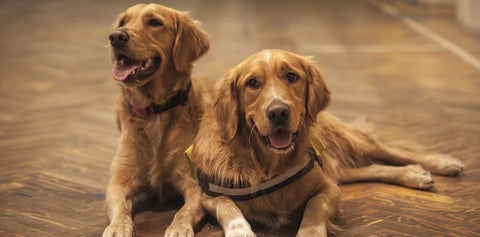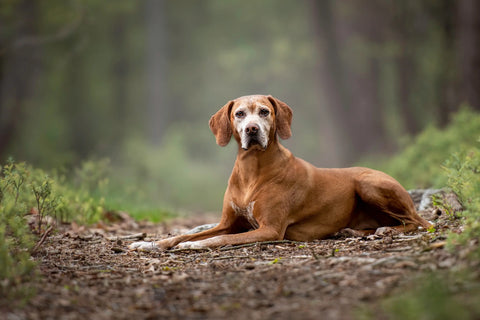
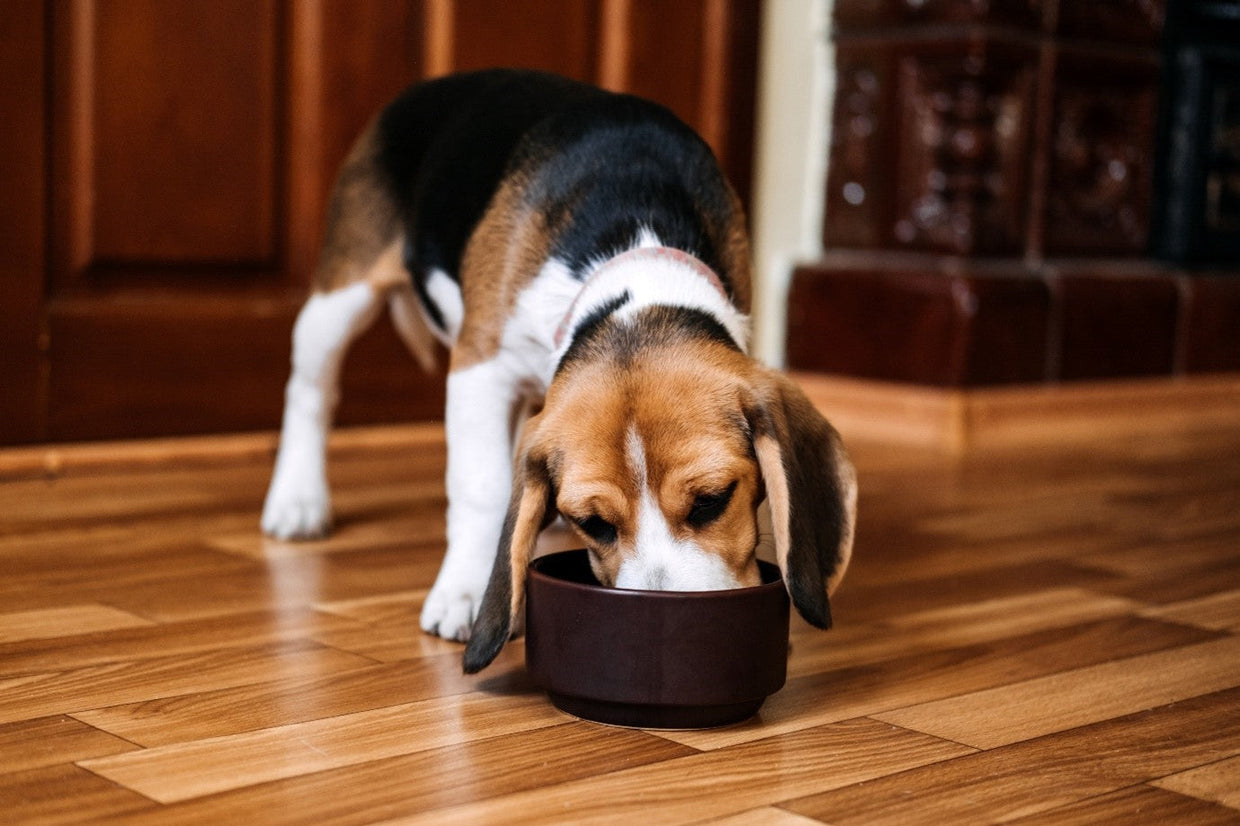
The odd things dogs eat, and how to react
Dogs are great, aren’t they? They’re cute, affectionate, and loyal, not to mention being great company. But sometimes, their peculiar eating habits can leave us scratching our heads (or holding our noses).
Whether it’s grass, poo, or things they find in the bin, our canine companions have a talent for sampling items that aren’t on their menu.
If this sounds familiar, don’t worry. We’ll help you better understand the weird things dogs eat, why they do it, and how to (hopefully) stop it in the future.
And remember, you’re not alone. Just go to the end of this article to read some personal anecdotes from our own YuMOVE team!
Grass and flowers
Grass is one of the more common things that you might catch your dog eating, outside of their usual diet. According to a 2007 study that analysed 1,571 surveys, 68% of the surveyed dogs were reported to eat plants on a daily or weekly basis.
So why do dogs often feast on foliage? After all, they’re not exactly grazing animals.
There are a few potential reasons
One is that they might be experiencing a dietary deficiency and are trying to compensate and top-up on some essential nutrients.
Another reason could be that they’re eating grass or plants to get more fibre, in order to maintain a healthy gut.
While it’s often said that dogs eat grass to help deal with an upset stomach, the study found only 9% of dogs frequently appeared ill before eating grass, and only 22% vomited afterwards, so this may not always be the case.
If your dog is excessively eating grass, especially over their own food, we would advise speaking with your vet.
What should I do about it?
Make sure to give your dog nutritious food, rich in fibre, and keep an eye on their overall health. Beyond this, it’s probably not a cause for concern if they occasionally chow down on a mouthful of grass.
When it comes to your dog feasting on flowers, though, be very cautious – as some flowers can be toxic to dogs. Your vet, or a professional trainer, can help with suggestions on how to prevent this behaviour.

Poo (their own and others’)
This one can turn even the most devoted dog lover’s stomach. Coprophagia in dogs, or the act of eating poo, is strangely common for our canine companions.
Causes of coprophagia in dogs
Although some people claim that dogs pick up this habit (scientifically termed ‘coprophagia’) due to a nutritional deficiency, or stress, at least one 2018 review published in the Journal of Veterinary Behavior concluded that:
“Coprophagy does not appear to be related to environment, lifestyle, physical activity, anxiety, type of food, nutritional status, or reproductive status. Coprophagic behavior may be influenced by the presence of a coprophagic cohabitant.”
In other words, it’s likely that your dog isn’t eating poo because they’re deficient in nutrients, or stressed, but they may be doing it because they’ve learned the behaviour from another dog.
How to stop dogs from eating poop?
Coprophagia definitely isn’t an ideal behaviour for your dog to pick up. Not only is it unpleasant, but it can also lead to an increased risk of contracting parasites and other potential health complications.
So, what should you do about it?
It’s generally a good idea to avoid scolding your dog when they engage in this behaviour. Instead, interrupt and distract them, and give them something better to do.
If the habit persists even after repeatedly interrupting it, consult with your vet, who'll be able to rule out any issues and suggest a qualified trainer if needs be. It is also sensible to regularly worm your dog.

Clothes and furniture
While your dog may not necessarily eat your clothes or sofa cushions, they may still attack and tear them up, from time to time.
Many dogs engage in this kind of destructive behaviour, and there can be a variety of different reasons why. They may do so as a way of externalising stress – maybe from separation anxiety, a lack of sufficient daily exercise, or even exhaustion.
Puppies, in particular, are likely to try and bite and chew things they shouldn’t as part of the teething process.
How to save your clothes and furniture
Start by focusing on the basics. Make sure your dog has a healthy and consistent daily routine. Take them for regular walks, and make sure they’re properly fed at regular intervals. If they’re showing signs of separation anxiety, consider consulting with a canine behaviourist.
As always, it’s a good idea to check in with your vet if a problematic behaviour becomes common, or if your dog does eat any of these things.
Birds, mice, and other small animals
It can be very upsetting to see your dog attacking, and even eating, birds, mice, or other small animals.
It’s important to remember that this kind of behaviour is largely instinctual, since dogs are natural predators. But that doesn’t mean you just have to let it slide.
How to stop it
There are various things you can do to protect small animals from your dog, and to prevent your dog from attacking them.
Fixing a bell to your dog’s collar will make it harder for them to sneak up on unsuspecting creatures like birds and keep them on a lead in areas where you know wildlife is present.
Playing with your dog regularly, and giving them chew toys, can also help to expend some of their aggressive energy.
Of course, you can also train your dog to ignore smaller animals and to disengage when commanded. A professional dog trainer can be a great help here.

Tales from the YuMOVE office dogs
As you know, YuMOVE is a company of pet lovers, and many of our team have dogs of their own.
Here are just a few unfortunate YuMOVE insider tales of dogs eating things they shouldn’t have.
“Coco will eat anything on the street if we don’t stop her… bits of bread left for birds, bird poo, cat poo, fox poo… She eats shoes, socks, anything out of the bin. Basically, anything Coco isn't allowed, she eats.” – Georgia
“Mac ate duck poo when he was a puppy and had to spend 2 weeks at the vet! He’s also eaten a large stone and plastic berries from a Christmas wreath. Those needed vet visits and were costly to remove. He’s ok now, though!” – Toby
“Baxter ate my husband’s curry when he left it on the coffee table unattended. Jumped up and got stuck in. We all paid for that later on that evening.” – Rachel
“On Christmas Day, Millie ate an entire paper bag of clotted cream fudge that had been given to me as a gift.” – Louise
“Teddy loves to eat horse poo.” – Jess
“When Mabel was a puppy, she must've found a sequined hair scrunchie in the park, somehow ingested it whole, only knew about it because it came out the other end in one piece.” – Hannah
If your dog has eaten something they shouldn’t, or you’re concerned about something they’ve eaten, always speak to your vet.
Digestive upsets go hand-in-hand with being a dog owner, but don’t need to catch you unawares. Be prepared by keeping a box of YuMOVE Digestive Care Rapid in the cupboard – it’s an easy-to-feed paste that’s designed to help firm stools, soothe the gut lining and support your pet’s recovery.
